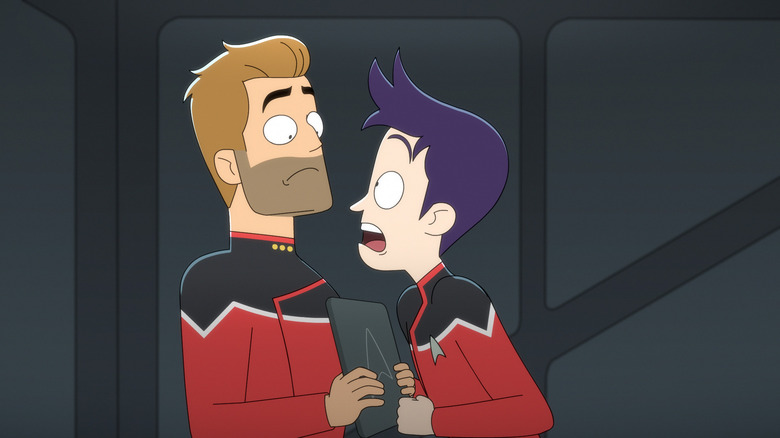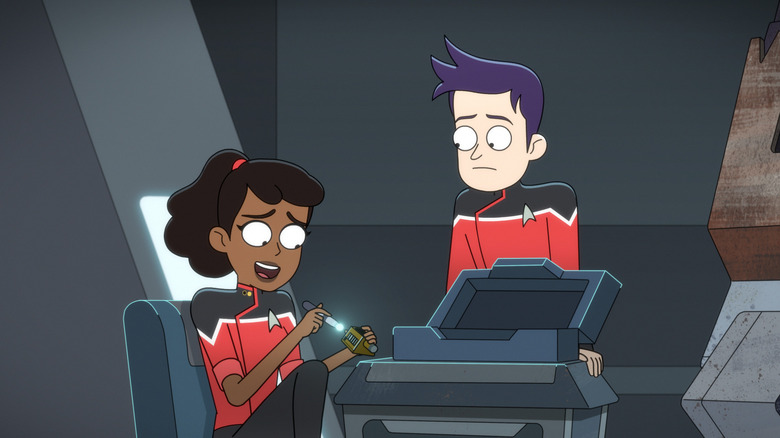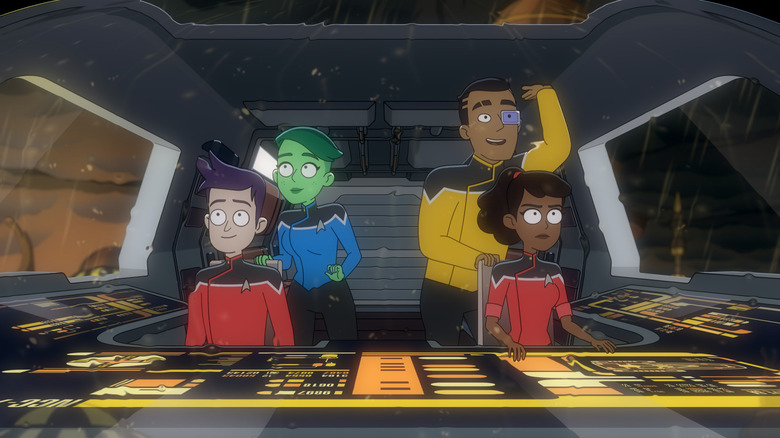Lower Decks Finally Addresses The Question Of TV In The Star Trek Universe
This post contains spoilers for the latest episode of "Star Trek: Lower Decks."
Viewscreens and computer monitors seem to serve a different function in the "Star Trek" universe than they do in ours. On "Star Trek," screens are used as communication tools, merely facilitating video calls. If someone watches a playback video on "Star Trek," it's typically a recording of a Starfleet mission or a home video of family members. It's very, very rare that a Starfleet officer will watch a filmed, scripted entertainment show — that is: traditional commercial television — on a 2-D screen.
/Film has previously written about the lack of cinema and TV on "Star Trek," positing that the medium had been supplanted by 3-D holodecks. Why watch a movie on a screen when you can enter a digitally generated immersible environment where you can play the lead character yourself? Active entertainment will take over passive entertainment in the future.
It was also posited that, thanks to the canonical 21st-century wars in "Star Trek," a lot of film and TV may have been wiped out, leaving Earth's cinema libraries empty. It could also be that the makers of "Star Trek" don't want to pay the licensing fees needed to present older movies in their sci-fi show.
Whatever the reason, commercial broadcast entertainment is incredibly rare on Trek, and Starfleet officers tend to have little experience with it. This means, quite sadly for Lieutenant Boimler (Jack Quaid), that said officers are going to be incredibly susceptible to the insidious manipulation of TV advertisements and chintzy soap operas. They haven't built up a protective layer of dismissive irony, so ads feel very real to them.
In the latest episode of "Star Trek: Lower Decks," "Parth Ferengi's Hart Place," Boimler visits the Ferengi homeworld of Ferenginar and finds himself unable to stop watching TV in his hotel room.
21st century TV vs. 24th century psyche
The premise of "Parth Ferengi's Heart Place" follows the show's four lead lieutenants as they are assigned tour guide duty. They are sent to Ferenginar to, essentially, write reviews of the local resorts and bars. Boimler, an overachiever, offers to review 40 locales even though the minimum is four or five. He is all business when he arrives at his first hotel, ready to record and rate the smallest details. When he flips on the TV, however, he is mesmerized. He becomes so mesmerized, in fact, that he never leaves his room, eager to see what happens next on this magical screen.
At the end of the episode, Boimler has reduced himself to squatting in a darkened room, his eyes red, stripped to his undergarments. Surrounding him are multiple half-eaten takeout containers. Eventually, Commander Ransom (Jerry O'Connell) has to send in a Ferengi security force to extract Boimler from his nest.
This ending implies an additional theory as to why there aren't movies or TV shows in the idyllic future of "Star Trek": they are a narcotic. Video media is, humanity has learned in the last century, incredibly influential over the human mind. Seeing something broadcast on a screen, even in the year 2023, lends it a strange legitimacy. TVs break down our cognitive defenses and push ideas, intentionally or not, straight into our brains. This is why Fox News has the power it does, even though its content is lunacy. If it comes through a TV screen, it must be trustworthy, right?
Although no such conceits have even been mentioned in the canon of "Star Trek," it's entirely possible that Starfleet's leaders have banned excess TV and film consumption for their officers. It's all too easy to plummet off the precipice.
A Supposedly Fun Planet I'll Never Visit Again
Of course, if we are to accept that TV media in "Star Trek" is too addictive for a utopian future to handle, it marks a rare note of cynicism in the franchise. Ordinarily, in "Star Trek," technology is presented as largely benevolent. In the 24th century, we will live in harmony with technology, using it to explore the galaxy, prevent want, and cure illnesses. And while there may be outliers who use tech for violent ends, they are always presented as just that: outliers. When someone develops a new technology that can be weaponized, they will likely be thrown in the brig by the end of the episode. People who aren't using technology properly — that is, peacefully, helpfully, and benevolently — will be ousted.
The characters in "Star Trek" may be intelligent (they study calculus in the third grade), but "Lower Decks" implies that many of them possess no media literacy. Boilmer, at the very least, can't look at scripted entertainment and shrug it off, wisely aware that it provides no intellectual nourishment. Instead, he is sucked in and hypnotized.
This hypothesis is backed up by the "Star Trek: Enterprise" episode "Carbon Creek" (September 25, 2002), wherein several Vulcans crash land on Earth in the 1950s. One of them, turning on the TV, becomes addicted to "I Love Lucy" (a show with a strong connection to "Star Trek"). Earth TV is an opiate that one cannot resist, not even logical Vulcans.
The gag of "Heart Place," of course, is that an overachieving character like Boimler is undone by something as simple as a TV show, but it does spell out some more chilling canonical details for "Star Trek." TV, it argues, is bad for you.


